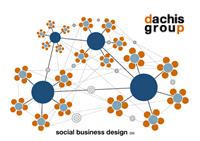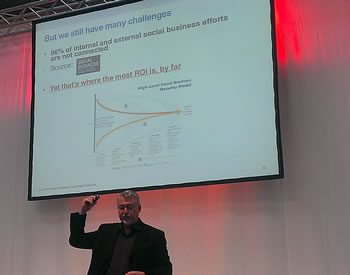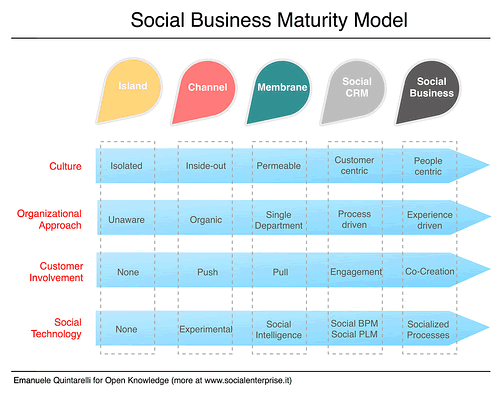
Social business is a buzzword, even if some already say it’s “dead”. Social business, part of a broader evolution and reality, is omnipresent and it is trendy to proclaim “it’s not about social media anymore but about social business.” However, social business is not a hype, on the contrary.
We use the term social business for many evolutions and realities. Sometimes for the wrong ones. But opinions vary and that’s normal. For some social business is all about social technologies. For others, its about what I would call a ‘connected and more human way of doing business’. The list goes on and depends on the background of the people who use the term (and of whom some stop using the term).
So, let’s take a look at what we mean by social business.
And here are five reasons why it matters to do so.
- The term social business is often used too much in a restricted way, depending upon the background of those using it.
- I see a large gap between the reality of social business, what consultants say about it and what practitioners do.
- Managers risk getting lost again in the unfortunate phenomenon whereby we ‘invent’ new terms, while forgetting that those who actually want to ‘do’ it, drown in a tsunami of consultant speak.
- Although we like to say social media is “passé” and it’s time for social business, we still focus a lot on the technologies and forget it’s about business, while it’s not about the technologies alone.
- Social business doesn’t mean a business is social, as some think. Business is business. Social is social. Allow me to elaborate on that later.
How social business is usually defined
For the record, as we did with the term ‘social marketing’ (which was originally meant to describe the use of marketing for ‘social good’ and is now often used when we really mean social media marketing), by using the term social business as we do today, we are killing the original meaning of a social business as defined by Nobel Peace Prize winner, Muhammad Yunus (just so you know).

Also note that the term social business in the context of this article might just go away again as the focus shifts towards digital business, integrated business etc.
However, no matter how we call it: in the end, it’s always business with people and experiences on one hand and (digital) business transformation on the other in the middle. And both are connected.
Today, the more popular buzzwords are digital disruption, digital transformation and human business, essentially to describe similar evolutions, from other perspectives. At CeBIT 2014, Sameer Patel (SAP) said that digital transformation is what social business should have been.
Dion Hinchcliffe: how social business grew up – and what’s next
Dion Hinchcliffe, who was also at CeBIT back then (see image above and video below), is co-author of Social Business By Design, until recently worked at Dachis Group (and after the acquisition by Sprinklr, since Spring 2014 runs his own firm) and is author of great pieces for ZDNet in the Enterprise Web 2.0 and social business space, said this about social business in an article, “How social business grew up”, a while back:
“The reality is that the term social business itself will continue to hold less and less meaning as more organizations just use the tools and ideas, and it steadily becomes the norm. While this point has been made before, I think we need to understand that digital engagement is a moving target”.
Social business definitions
Time for those definitions. You can already note this: there is no perfect definition, social business really means many things.
The reason is simple: business is about many things, processes, stakeholders, functions, goals, ecosystems and people (the famous fifth “P”) as well. Imagine the impact of social in all that. Furthermore, note that social business, as a reality, not as a term, will not die if tomorrow Facebook or Twitter stops existing.
Social Business according to Peter Kim

Peter Kim (Chief Digital Officer at Cheil Worldwide and co-author of Social Business by Design): “A social business harnesses fundamental tendencies in human behavior via emerging technology to improve strategic and tactical outcomes.”
According to some, this is typically something a consultant would say. However, check out the explanation of the definition Peter gives on the page where it can be found, mentioning consumer participation, organizational aspects, workforce collaboration, consumerization, the workplace and more.
Social Business according to IBM
Here is how IBM looks at it (IBM of course sells collaboration, community, and social-listening tools), although that doesn’t really matter when talking about the essence.
IBM has defined three characteristics of a social business: engaged, transparent and nimble. This is IBM’s definition: “Social Business is about moving beyond the social media tools you’re currently familiar with to unlock the potential of the people and gain a competitive advantage. Today, by combining social networking tools—internally and externally—with sophisticated analytic capabilities, companies are transforming their business processes, building stronger relationships among their employees, customers and business partners and making better decisions, faster. This is what makes a social business—embracing networks of people to create new business value and opportunities.” You find it on the bottom on this page where IBM describes its take on social business.
Social Business according to David Kiron
David Kiron is the Executive Editor of MIT Sloan Management Review’s Innovation Hubs. I mention them because they did quite an exhaustive survey on social business with Deloitte.
When asked what social business is, this is what David answered: “My short, quick answer is that social business is “social” in the sense that it (a) enhances modes of collaboration that already exist in an organization (e.g., high definition video conferencing adds another social dimension to teleconferencing); and (b), enables new modes of collaboration (e.g., technology enabled crowd sourcing or collaborations in virtual reality). In other words, I’m suggesting that the “social” in social business reflects differences of degree and kind from traditional approaches to business collaboration…I wouldn’t say that an organization that fails to engage in social business is nonsocial. Rather, such a company would be stuck with traditional, low-tech approaches to collaboration.”
Social Business according to David Armano
David Armano looks at things in perspective (that’s also why I stole one of his illustrations for this post). At least, he took the effort to look at the bigger picture, mainly from a historical “technology and social computing meet business” perspective.
David: “Despite much of the chatter around “social business,” the reality is that most organizations are currently dealing with the realities of social media and only a few truly recognize the potential of social business. Not unlike how digital media evolved into digital business—social business takes the foundation of social media and begins to build new economic models on top of it.”
Social Business according to Deloitte
Deloitte is very involved in the whole social business topic, as are companies such as IBM, so it’s hard to overlook them.
Here is Deloitte’s definition: “Social Business is a concept that goes beyond the buzz of social media networks; it’s a practice that can enable more efficient, effective and net-new connections inside and outside your organization to drive performance. The organizations that discover value are doing so with a layered approach that crosses organizational boundaries, functions and services. While this may be alarming for many executives, the new world of transparency, knowledge flows and democratized opinion-making is rife with opportunities.”
Social business undefined
There are more definitions regarding social business, much more. I could write an (e)Book just quoting them. But, again, much depends on the background and viewpoint of those who define it. And the term might just be used in its’ original context again one day.
Another good source of information is this page on the Social Business Forum website, where you find plenty of models such as the one below, originally posted here) and, indeed, a definition: “An organization that has put in place the strategies, technologies and processes to systematically engage all the individuals of its ecosystem (employees, customers, partners, suppliers) to maximize the co-created value”.

Brian Solis has been writing a lot about social business and talked about it one of our events. In his foreword of Michael Brito’s Smart Business, Social Business, Brian wrote “A social business is one with its communities, wherever they reside. As customers view businesses as one brand and not as a series of disconnected units or departments, a social business is connected, engaged, and adaptive. United on all fronts, a social business connects the dots between value and customer experience as it heralds a new era of relationships and operates under a banner of transparency and open leadership”.
Olivier Blanchard has been covering social media from the viewpoint of different business functions since the very beginning, probably without ever really using the term social business but emphasizing the role of social across the organization.
Jamie Notter and Maddie Grant did a great job in identifying key drivers in social media and applying them to business and management, while defining key characteristics in their book Humanize (open, trustworthy, generative and courageous).
Jamie and Maddie, however, also talk about the people-centric organization and the human business, while still others prefer to talk about the humanistic business.
In the end, it doesn’t matter. There is a bunch of good thinkers, smart people and great practitioners out there that are all understanding the same four things:
- Business is changing and we feel it everywhere.
- Consumer behavior is changing and people don’t want to be treated as, well, consumers.
- Technology disrupts business, faster than ever. Disruption is good if we want to and dare leaving the comfort zone.
- We have great opportunities here (and if we don’t act upon them we’ll have a problem, Houston).
So, maybe it’s not that important to define social business. Then, what is?
It’s far more important to understand how your business can evolve by effectively embracing the fundamental principles of a business era in which social technologies and sociological changes affect the ways in which organizational success and ‘customer’ success is achieved. And this goes for ALL business processes.

